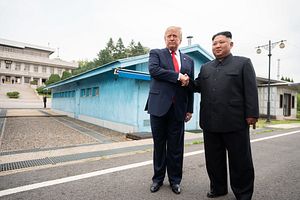On Monday, the North Korean Foreign Ministry released a statement attributed to senior official Kim Kye Gwan. The statement was responding to a tweet by U.S. President Donald J. Trump over the weekend — his first in weeks addressing North Korea in any way. In that tweet, Trump addressed a recent attack by North Korean media against Joe Biden, the former U.S. vice president and current Democratic Party contender for the presidential nomination.
“Mr. Chairman, Joe Biden may be Sleepy and Very Slow, but he is not a ‘rabid dog.’ He is actually somewhat better than that, but I am the only one who can get you where you have to be,” Trump said. “You should act quickly, get the deal done. See you soon,” he added. Trump was responding to another tweet citing a write-up in the United Kingdom-based tabloid, The Sun, on a North Korean state media article that slammed Biden.
The “See you soon” in Trump’s tweet got many commentators speculating about the possibility of a behind-the-scenes effort at yet another Trump-Kim meeting: a possible fourth summit. Kim Kye Gwan has now put an end to that speculation. “Reading an article posted by President Trump on Twitter on Nov. 17, I interpreted it as a signification indicative of another DPRK-U.S. summit,” Kim said, acknowledging that Trump’s tweet had indeed given that appearance.
“Three rounds of DPRK-U.S. summit meetings and talks were held since June last year, but no particular improvement has been achieved in the DPRK-U.S. relations,” he said. “And the U.S. only seeks to earn time, pretending it has made progress in settling the issue of the Korean peninsula.”
Kim finally concluded: “We are no longer interested in such talks that bring nothing to us,” adding that “As we have got nothing in return, we will no longer gift the U.S. president with something he can boast of, but get compensation for the successes that President Trump is proud of as his administrative achievements.”
Kim Kye Gwan’s latest statement follows a range of others of varying degrees of intensity in recent days and weeks. The most authoritative recent statement, attributed to the State Affairs Commission, North Korea’s apex decision-making body, was unsubtle, warning of a “greater threat” to the United States if negotiations fail entirely. The statement reiterated Kim Jong Un’s New Year’s Day warning of a “new way” that might await the United States on the other side of January 1, 2020.
The reasons for North Korea stemming its enthusiasm about talks could be varied. For instance, this could be nothing more than a negotiating tactic, with the North Koreans betting that Trump needs a summit with them more than they need one with Trump. Time, however, might not be on North Korea’s side. The bite of sanctions continues to cause pain to Pyongyang; what is clear, however, is an interest in avoiding another outcome like Hanoi, where Kim Jong Un travels long and far only to find himself embarrassed by a no-deal outcome.
In concluding his statement, Kim Kye Gwan reminds us of Kim Jong Un’s post-Hanoi April request for a “bold decision” from the United States. “If the U.S. truly wants to keep on dialogue with the DPRK, it had better make a bold decision to drop its hostile policy towards the DPRK,” Kim Kye Gwan says. The “hostile policy,” as always, remains undefined, but for North Korea, this has largely meant, in the short term, a sanctions relief package.
The last round of working-level talks between the United States and North Korea in Stockholm suggested that both sides are no closer to a “small deal” that might trade a limit amount of relief from UN Security Council resolution sanctions for modest North Korean concessions on its nuclear and ballistic missile programs. Without evidence of a change in the U.S. position—of which there is currently none—the North Koreans appear disinclined to roll the dice with yet another face-to-face meeting with Trump.

































